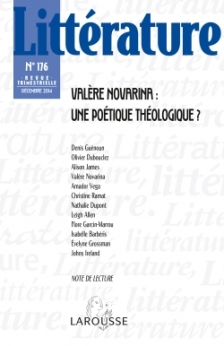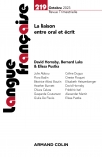
Littérature n°176 (4/2014)
Pour acheter ce numéro, contactez-nous
Recevez les numéros de l'année en cours et accédez à l'intégralité des articles en ligne.
La parenté qui s’affiche entre exégèse biblique et parole poétique chez Novarina se recommande moins des modèles prédicatifs en quête d’un sens sacré qu’elle ne cherche à en ébranler les assises. En effet, le recours aux préceptes énoncés dans le Grand Livre assure moins en cette oeuvre les attributs de Dieu que leur renversement. Fondant son ars poetica sur la sublime humilité du Créateur (sa kénose), l’auteur érige son oeuvre à flanc d’inquiétude – opus incertum –, à la gageure du déséquilibre et del’effondrement, et motive l’écriture d’une impulsion nouvelle capable de mener, à force de détours et retournements, dans l’excès du désoeuvrement.
The ways biblical exegesis and poetic language intersect in the works of Novarina do not so much signal an authorial intention to replicate the predicative models in search of the Sacred, as they question their foundations. Indeed, the author’s preoccupation with theological dogma and doctrines leaves his characters (thus his readers) less assured of God’s attributes, than of their inevitable reversal. In fact, the precarious linguistic and syntactic constructions in his works resemble that of an opus incertum, as opposedto an Opus magnum, the Work of God. This in turn explains the many detours, disequilibrium, and falls depicted in Novarina’s ars poetica as highly evocative of the Creator’s sublime humility (His kenosis).

